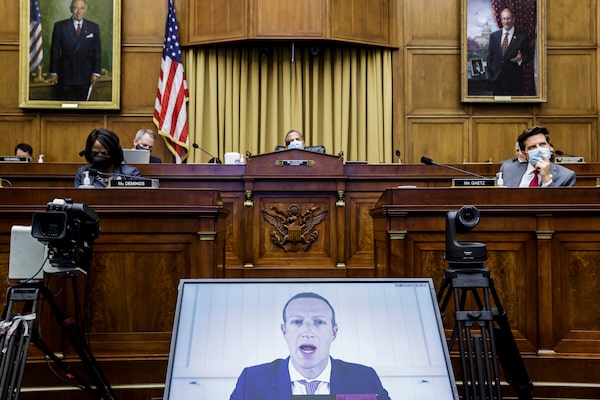
Facebook CEO Mark Zuckerberg speaks via video conference during a House Judiciary subcommittee hearing on antitrust on Capitol Hill on July 29, 2020, in Washington.Graeme Jennings/The Associated Press
Silicon Valley’s most powerful executives faced an onslaught of attacks Wednesday from U.S. lawmakers who accused tech giants of destroying competitors, controlling political speech and forming close ties with China in a landmark antitrust hearing that raised the threat of new regulation.
In marathon testimony that stretched into the evening, members of the Democrat-led House Judiciary Committee grilled Amazon.com Inc.’s Jeff Bezos, Apple Inc.‘s Tim Cook, Alphabet Inc.‘s Sundar Pichai and Facebook Inc.’s Mark Zuckerberg on whether their businesses have grown so powerful that they have become a threat to American democracy.
Democrats pressed Mr. Zuckerberg about Facebook’s aggressive tactics to compete with Instagram before acquiring the photosharing-app in 2012. They grilled Mr. Bezos on whether his company discriminates against small merchants who make a living selling through Amazon. Mr. Cook faced questions about whether Apple exerts too much control over developers on its App Store, while Mr. Pichai grappled with a wide-ranging set of grievances against Google, from its search-engine algorithms, to its political leanings, to its business dealings in China.
Republicans raised their own set of concerns with Silicon Valley’s growing power, accusing tech executives of using their might to support liberal causes and discriminate against conservatives.
The hearing, conducted virtually, was the culmination of a year-long congressional investigation into the technology sector. All four companies also face parallel antitrust investigations by federal agencies, state attorneys-general and European regulators.
The growing hostility toward Big Tech represents a sea change for U.S. policy makers who once lauded Silicon Valley as a centre of global innovation, but have increasingly come to see tech firms as dangerous monopolies.
“Our founders would not bow before a king,” chair of the antitrust subcommittee David Cicilline, a Democrat from Rhode Island, told the executives. “Nor should we bow before the emperors of the online economy.”
The four executives all sought to cast their companies as American-made success stories who face intense competition both within the U.S. and from abroad.
In his first appearance before Congress, Mr. Bezos described himself as a uniquely American rags-to-riches example who left a lucrative finance job and risked his family’s modest savings starting Amazon.
Mr. Pichai emphasized the opportunities he found when he moved to the U.S. from India, while Mr. Zuckerberg highlighted the growing competition from social-media apps and other technology based in China.
“We compete hard, we compete fairly, we try to be the best,” he said. “That’s what I was taught matters in this country.”
Mr. Bezos, 56, the world’s richest man, faced sustained criticism for Amazon’s treatment of the small businesses that sell products through the e-commerce giant.
He acknowledged he was investigating a recent Wall Street Journal report that contradicted Amazon’s claims it does not use data about third-party sellers to develop competing products. “I can’t guarantee you that policy has never been violated,” he said.
Lucy McBath, a Democrat from Georgia, accused Mr. Bezos of crushing the small businesses that rely on Amazon. She played a recording from an unidentified seller who said her textbook business had been abruptly shut out of Amazon because she competed with the e-commerce giant’s own textbook sales. “We followed all the rules that were set by you,” the woman said in the recording. “Please just help us in earning our livelihood. We beg you. There are 14 lives at stake.”
“I appreciate you showing me that anecdote,” Mr. Bezos responded. “I would like to talk to her. It does not at all seem like the right way to treat her and I’m surprised by that.”
Lawmakers also aimed their fire at Mr. Pichai, grilling him on whether Google’s search engine results are designed to favour its own services and those of high-paying advertisers.
Mr. Cicilline accused Google of stealing content from competitors. “The evidence seems very clear to me as Google became the gateway to the internet, it began to ... use its surveillance over web traffic to identify competitive threats and crush them,” he said.
Republicans pressed Mr. Pichai about why Google had withdrawn from a Defense Department project to analyze drone footage after an employee backlash.
Ken Buck, a Republican from Colorado, drew parallels between what he said were Google’s efforts to copy the products and services of competitors and Chinese corporate espionage. “It made me wonder what values Google and Communist red China have in common,” he said.
Mr. Pichai emphasized his company’s work on cybersecurity with the U.S. military and argued that Google artificial-intelligence operations in China are “very, very limited in nature” and amounted to “a handful of people working on open-source projects.”
The congressional investigation has requested more than a million documents from the tech giants and their adversaries, including internal company correspondence that appeared to undermine their assertions that they value competition.
Lawmakers read from Facebook documents that suggested Mr. Zuckerberg had threatened an Instagram co-founder to sell his business to Facebook for US$500-million or face competition from a similar product that Facebook was building. The social-media giant eventually bought Instagram for US$1-billion in 2012.
Mr. Zuckerberg told Joe Neguse, a Colorado Democrat, that his suggestion in an internal 2012 e-mail that Facebook would one day become big enough to buy Google “sounds like a joke.”
“I don’t take it as a joke,” Mr. Neguse replied.
Mr. Cook faced the least amount of scrutiny at the hearing, though he was pressed on whether Apple discriminates against developers who use its iPhone App Store.
“There’s competition for developers, just like there’s competition for customers. " Mr. Cook replied. “It’s so competitive that I would describe it as a street fight for market share in the smartphone business.”
Your time is valuable. Have the Top Business Headlines newsletter conveniently delivered to your inbox in the morning or evening. Sign up today.
 Tamsin McMahon
Tamsin McMahon